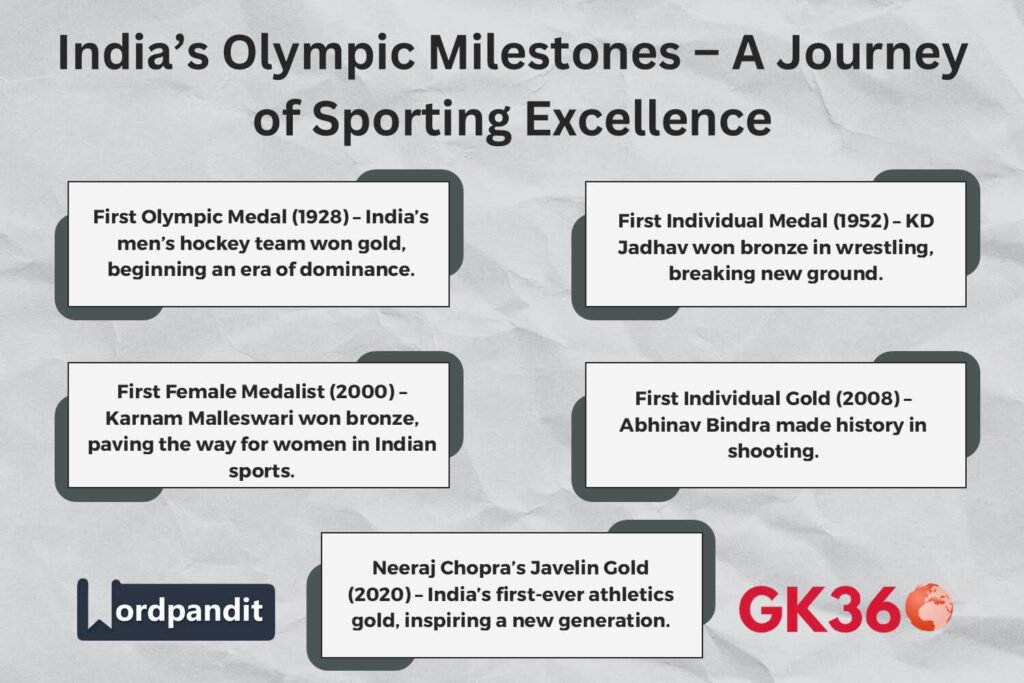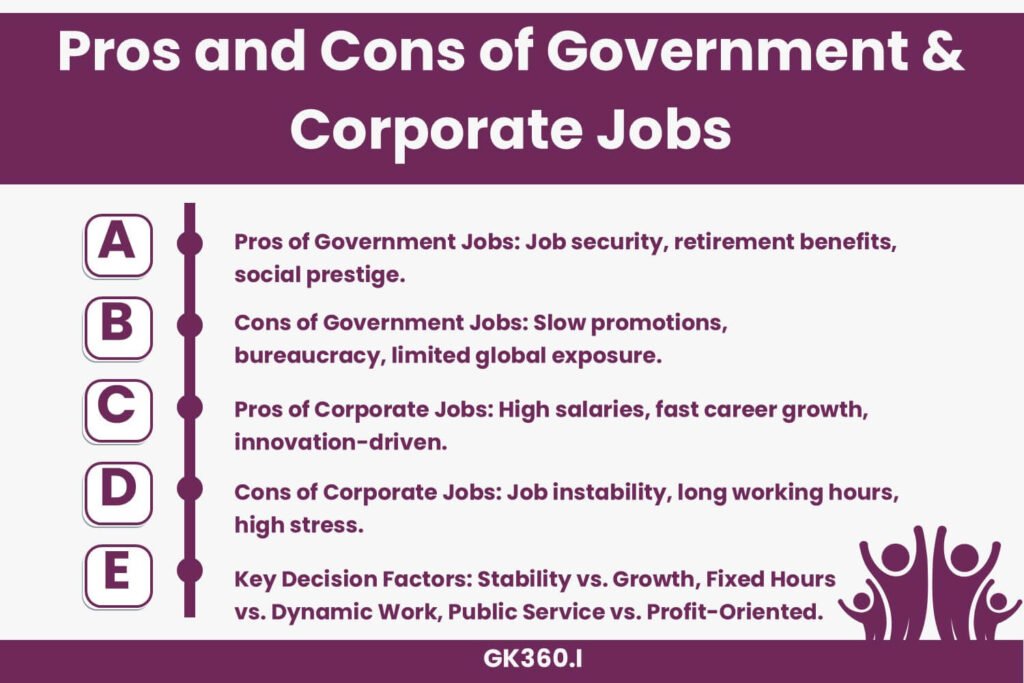Government Jobs vs. Corporate Jobs: Which Career Path is Right for You?
Introduction
Imagine a young graduate, fresh out of university, standing at a career crossroad. To the left lies the well-trodden path leading to a secure government job, with promises of stability, job security, and a well-defined structure. To the right, an alluring corporate avenue beckons, offering higher initial salaries, opportunities for rapid growth, and the excitement of working in a dynamic, ever-evolving environment. Which path should the graduate take?
In an era where education is more accessible than ever, and where the job market presents both opportunities and challenges, the debate between government jobs and corporate jobs remains highly relevant. This article provides an in-depth analysis to help students and job seekers navigate this crucial career decision.

Table of Contents
- Why Government Jobs Offer Stability and Prestige
- The Corporate World: Growth and Opportunity
- Challenges in Government Jobs
- Challenges in Corporate Jobs
- Real-World Case Studies
- Ethical Considerations in Career Choices
- FAQs
- Conclusion: Making an Informed Decision
Why Government Jobs Offer Stability and Prestige
- Unmatched Job SecurityGovernment jobs in India are synonymous with lifelong employment. Unlike the private sector, where downsizing is common, government employees enjoy significant job security, making this an attractive career path.
- Social Status and PrestigeIn Indian society, government jobs carry a high level of prestige. Particularly in smaller towns and rural areas, government employees are respected and often seen as role models.
- Benefits and PerksGovernment employees receive numerous benefits such as pensions, health insurance, and housing allowances. The guarantee of a pension plan is a major factor influencing many to choose government careers.
The Corporate World: Growth and Opportunity
- A Dynamic Work EnvironmentThe corporate sector is known for its fast-paced and innovative nature, making it highly rewarding for those who thrive on challenges and growth.
- Higher Initial SalariesCorporate jobs typically offer higher starting salaries compared to government jobs. Financial incentives, performance-based bonuses, and stock options make corporate jobs lucrative.
- Rapid Career AdvancementIn contrast to government jobs, where promotions are often based on seniority, corporate jobs reward performance and skill development, allowing for quicker career progression.
Challenges in Government Jobs
- Bureaucracy and Slow Career GrowthThe rigid hierarchical structure can hinder innovation and limit career growth, leading to frustration among ambitious professionals.
- Limited Exposure to Global TrendsGovernment roles, especially in non-urban settings, often lack exposure to international markets and emerging technologies.
- Resistance to ChangeGovernment institutions are known for slow adoption of new technologies and processes, which can lead to inefficiencies.
Challenges in Corporate Jobs
- Job InsecurityUnlike government jobs, corporate jobs do not offer lifelong job security. Layoffs, restructuring, and performance-based terminations are common.
- High Work Pressure and BurnoutMeeting tight deadlines, achieving ambitious targets, and maintaining work-life balance can be stressful in the corporate world.
- Ethical DilemmasEmployees in the corporate sector often face ethical conflicts, such as prioritizing profits over ethical business practices.
Real-World Case Studies
- Case Study 1: The Journey of a Civil ServantAnjali, a UPSC Civil Services Exam topper, secured an IAS position. While she enjoys prestige and the ability to influence policy, she also navigates bureaucratic challenges and slow policy implementation.
- Case Study 2: A Corporate Success StoryRohan, an MBA graduate, joined a multinational company and quickly rose through the ranks due to his innovation and dedication. However, he often struggles with work-life balance and high performance expectations.
Ethical Considerations in Career Choices
- Social Responsibility vs. Profit MotivesGovernment jobs involve public service, while corporate jobs prioritize revenue generation, sometimes leading to ethical dilemmas.
- Ethical Challenges in Both Sectors
- Government: Corruption and nepotism can be obstacles to integrity.
- Corporate: Pressure to meet profit targets can lead to unethical business decisions.
FAQs
- What are the major differences between government and corporate jobs?Government jobs offer stability and benefits, while corporate jobs provide higher salaries and faster career growth.
- Do government jobs pay better in the long run?Although corporate jobs start with higher salaries, government employees benefit from pensions and long-term financial stability.
- Which job sector has better work-life balance?Government jobs generally offer a better work-life balance compared to the demanding schedules of corporate roles.
- What qualifications are needed for top government jobs?Most high-ranking government jobs require clearing competitive exams like UPSC, SSC, or State Public Service exams.
- How can I prepare for a government job exam?Consistent preparation, coaching, and staying updated with current affairs are key to cracking government job exams.
Conclusion: Making an Informed Decision
Choosing between a government job and a corporate job is a personal decision that depends on individual priorities, values, and long-term career aspirations. Government jobs provide security and stability, while corporate jobs offer financial growth and rapid advancement.
Before making a decision, consider factors such as job security, work-life balance, career growth, and ethical alignment with your values. Whether you opt for the stability of a government role or the dynamism of the corporate world, aligning your career choice with your strengths and aspirations is the key to long-term success and satisfaction.
Key Takeaways Table
| Aspect | Government Jobs | Corporate Jobs |
|---|---|---|
| Job Security | High (permanent employment) | Low (performance-based) |
| Salary Growth | Slow but stable | Fast-paced, performance-driven |
| Work-Life Balance | Fixed working hours | Often long & demanding hours |
| Promotion System | Seniority-based | Performance-based |
| Social Status | High respect, especially in rural areas | Recognized in urban & global circles |
| Skill Development | Limited exposure to private sector trends | Fast adaptation to market innovations |
Related Terms:
- Government Jobs vs. Corporate Jobs
- Best Career Options in India
- Government Job Benefits in India
- Corporate Job Salary Growth
- Public Sector vs. Private Sector Careers
- Job Security in Government Jobs
- Pros and Cons of Corporate Jobs
- UPSC vs. MNC Careers
- Government Job Stability vs. Corporate Dynamism
- How to Choose Between Government and Corporate Jobs






